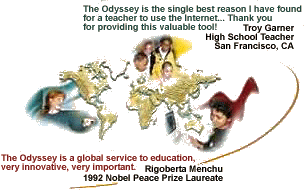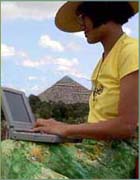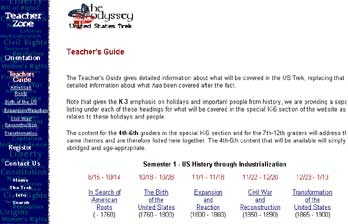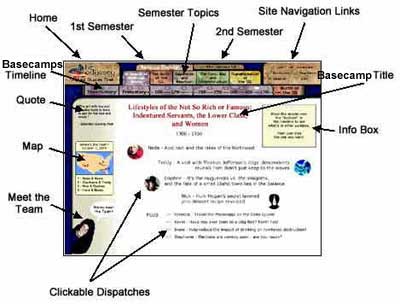
Orientation
NOTE: This orientation hasn't been updated since the Trek was underway in 2000-2001, so if it might refer to the Trek as something going on or coming up. Don't be confused by that! The US Trek is free for use anytime by anyone. Just get on the website and go!
Whenever it ties in with what you are covering with your students or brings in something new, just schedule it into your lessons as you would a video or class visit or field trip. This may mean:
Just have them get on the site at www.ustrek.org and have them choose the appropriate section: K-6 or 7-12 (for free).

|
US Trek Purposes The US Trek in a Nutshell What Will Be Covered How to Use the US Trek Matching the US Trek to Your Curriculum What It's Like for Students Free Registration |
The 3 Purposes of the United States Trek:
The content, which consists of between 5 and 9 individual reports from the Team, is much more alive and fun than most curriculum. It is created by a Team of young, diverse individuals who the students come to know and identify with, and who are there reporting from the places where events actually happened, giving them interest and relevance.
With National Education Standards for US History as the backbone, the itinerary has the US Trek Team addressing specific topics on set dates. Those topics for the first semester are:
I. In Search of American Roots
II. The Birth of the United States
III. Manifest Destiny
IV. The Civil War and Reconstruction
V. The United States Transformed
Second Semester Themes TBA
As with any new resource you want to use with your students, the US Trek is most effectively and easily used as a supplement to your existing curriulum. You've seen above what we are going to cover and when. Hopefully it coincides with when you plan to cover related topics.
For starters, make plans tp have your class or a group of students get on the Internet to check out the updates that cover topics that interst you. With previous Odyssey Treks, teachers have very effectively had students lead discussions on the topic after exploring an update. Others have assigned questions or writing topics. Still others assign more elaborate activities like debates or presentations or art projects. It's all about giving some structure and accountability to the students and having them apply what they learn, just as you would with any other classroom resource.
As you grow accustomed to using the website with
your students you can begin to take advantage of the special events such
as chats that we schedule. We'll let you know about these beforehand by
e-mailing you once you've registered.
There are two main sections - one for K-6 and the other 7-12. The difference is simply that the K-6 section has about 30% as much material - the reports are specially selected for their appropriateness for younger students, they are shorter and written for their reading level (or for your out-loud reading level).
In both sections students will be welcomed by what is called the "Basecamp" page. It features the latest update from the Team and has a title at the top - the same as the ones listed above. It then lists the different reports from the Trekkers that students can click on and check out.
From the basecamp they can also go back and check out previous updates using a timeline, as well as get information on who the Trekkers are.
After you finish this quick orientation definitely click over to the "Trek" section of the site so you can see what the students will experience. (Click here for K-6 and here for 7-12.)
Thank you, and may your experience with The Odyssey United States Trek be meaningful and enjoyable!

![]()
The US Trek in a Nutshell
![]()
The US Trek allows your students to follow along via the Internet with a Team of educators doing the 9-month trek around the United States to explore US history and culture. These eight educators, selected from over 500 applicants, are equipped with laptops and digital video equipment. They document the people and places they visit through their own writing, pictures and video, and this content is updated on The Odyssey website every Wednesday and Saturday so your students can experience the Trek and the excitement in learning vicariously.
Core content from the Team includes images and video that most students do not experience with traditional curriculum yet which are critical to fully appreciate history. It also includes special live and recorded interviews with significant people. In previous projects these have included former Presidents, Nobel Peace Prize Laureates, and experts in specific areas of history. Throw in periodic live chats with experts and other students and you wind up with an extremely engaging and educational US History experience for your students.

What is Covered?
75% of US History teachers address the subject as a one-year survey course, beginning with the origins of US History through the present day. To best allow for integration with regular course curriculum, the US Trek will follow the same progression, addressing US History through Industrialization in the fall semester, 2000, and The United States in the 20th Century in the spring semester, 2001.
9/13 : First Team Update - The Diverse Histories of the US Trek Team
![]()
9/16 : The Geography of the United States
![]()
9/20 : Human Origins in the Americas
![]()
9/23 : Native Americans - Major Cultural Groups (pre-Contact)
![]()
9/27 : Native Americans - Major Developments and
![]() Diverse Cultural Characteristics (pre-Contact)
Diverse Cultural Characteristics (pre-Contact)
![]()
9/30, 10/4 : The Early Explorers and the Colonists
![]()
10/7 : Lifestyles of the Not So Rich or Famous -
![]() Indentured Servants, the Lower Class, and Women
Indentured Servants, the Lower Class, and Women
![]()
10/11 : Slavery in the Colonies and Early African American Culture
![]()
10/14 : Native American Responses Up To the American Revolution
10/18 : Revolutionary Flashpoints - Issues, People and Places
![]()
10/21 : The Unfolding of the American Victory
![]()
10/25 : Foundations of the US Government
![]()
10/28 : US Expansion Through the Mid-1800's
![]()
11/1 : Native American Responses Through the Mid 1800's
![]()
11/4 : The Mexican-American War
![]()
11/8 : The Economic Machine and the Reaction
![]()
11/11 : The Age of Reform
![]()
11/15 : The Women's Rights Movement
11/18 : Life in the South
![]()
11/22 : Paths of Resistance and Rebellion
![]()
11/25 : Thanksgiving Break - No Update
![]()
11/29 : Life in the North
![]()
12/2 : The Abolitionists
![]()
12/6 : Flashpoints on the Road to the War - People, Places and Motivations
![]()
12/9 : The Civil War
![]()
12/13 : The Question of Emancipation and the End of the War
![]()
12/16 : Reconstruction Begun
![]()
12/20 : The Fall of Reconstruction
12/23, 1/3 : National Expansion, Industrialization, and Immigration
![]()
1/6 : Industrialization
![]()
1/10 : The Rise of Unions
![]()
1/13 : National Politics - The Interstate Commerce Act and Sherman Anti-Trust Act
For each of these broad themes, we have identified several specific topics to explore. For example, for the October 11 update, addressing "Slavery in the Colonies and Early African American Culture," the following topics were addressed:
For each of these topics, members of the US Trek Team will split up to visit places and people that bring the topics to life. For example, for this same update the Team's visits included:
![]()
![]()
![]()
![]()
![]()
![]()
So you've got a list of the themes to be covered, but what if you want to know about the specific topics, or where exactly the Team will go to cover those topics? This information is available in the Teacher's Guide, one of the main sections of the Teacher Zone. You can always go there by clicking "Teachers Guide" in the upper left corner of any webpage in the Teacher Zone.
![]()
![]()
![]()
![]()
So How Does a Teacher Use the US Trek?
 The US Trek is completely free. The Odyssey is a non-profit, 100% volunteer-run organization, so our compensation is simply that you use it!
The US Trek is completely free. The Odyssey is a non-profit, 100% volunteer-run organization, so our compensation is simply that you use it!
 Note that with the website being updated every Wednesday and Saturday afternoon, students can explore new material as frequently as twice a week. And if you want you can check out an update after it is posted on Sunday or Wednesday (at 3pm both days) before you assign it so you can see in detail how it covers the topics we've listed above.
Note that with the website being updated every Wednesday and Saturday afternoon, students can explore new material as frequently as twice a week. And if you want you can check out an update after it is posted on Sunday or Wednesday (at 3pm both days) before you assign it so you can see in detail how it covers the topics we've listed above.
What if the Timing of Our Itinerary and Your Curriculum Don't Match Up?
All of the content the Team posts on the website is "archived," meaning your students can always get to it. If we are running ahead of your own schedule, you can just have your students go back and look at the material after the fact. This also means you can use all of the material with your classes next year and beyond.
What Will the Website Be Like For Students?

Bring World History to Life
The Odyssey's previous project was a two-year World Trek. It is very similar to the US Trek in tone and organization. You can check out the World Trek here.
Before you go...
Be sure to Register! This is how we keep in touch with you about the upcoming chats and other special events. It's also how we keep track of who is using the site so we can continue to receive funding!
It's free, quick and confidential, so please do so now.
![]()
![]()
![]()
![]()
![]()
![]()
![]()
![]()
![]()
![]()
![]()
![]()
![]()
![]()
![]()
![]()
©2000 The Odyssey: World Trek for Service and Education. All rights reserved.